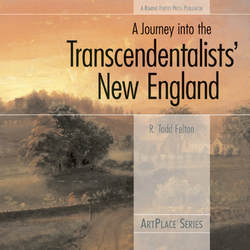Читать книгу A Journey Into the Transcendentalists' New England - R. Todd Felton - Страница 7
На сайте Литреса книга снята с продажи.
Preface and Acknowledgments
ОглавлениеSome of us can remember the first time we came into contact with the Transcendentalists. For me, Thoreau’s Walden was one of the hurdles that stood between me and high school graduation. I’d like to say reading Thoreau in my senior English course changed my life, but it didn’t. For years, all I remembered was a passage about the warring ants, because our house, like many houses in California, was occasionally infested by ants, and I thought the idea of them fighting each other was cool.
However, after years of teaching writing and running a writing center, I began to be interested in how groups of writers fed off each other’s ideas and energies. In my literature courses, my students explored various groups of writers and how they interacted with each other—the Beat poets, the British Romantics, the members of the Irish literary revival—so when I saw an opportunity to delve into another group of artists and thinkers, I jumped at the chance.
My initial emphasis in researching this book was on the connections among the Transcendentalists—the ways they spurred each other on through one-on-one conversations and group discussions. However, as I quickly came to appreciate, Transcendentalism is first and foremost about forging one’s own relationship with the universe, whether that is a spiritual, philosophic, aesthetic, moral, or practical bond. This individuality makes it hard to convey a unified vision of Transcendentalism, or even of its practitioners.
There is a danger inherent in any study of a literary group that someone of merit will be left out. Given the loose, shifting coterie that made up the Transcendentalists, that danger is manifold. I chose to limit myself to New England Transcendentalist artists and thinkers who, through written word or deed, had made a substantial impact on the culture of the nineteenth century.
Because of that filter, some worthy writers receive scant attention in these pages. Walt Whitman, while a major voice in American literature, was neither a New Englander nor a Transcendentalist, although he greatly admired Emerson and met with him as well as with Alcott and Thoreau. The poet Ellery Channing receives only passing mention because his writing has not had a lasting impact on the American canon. These are just two of the figures who would be discussed at length if this book were much larger.
Other names, too, deserve mention, not necessarily for their gifts to literature but for their gifts to me. My wife, Chris, has long been my best editor as well as my best friend. To her I give my heartfelt thanks and gratitude for sharing all of my projects with me. My two boys, Tim and Liam, have shared with me their curiosity and joy. Throughout my many months of research and writing, they were emissaries from a world I might otherwise have forgotten. Meg Lenihan has provided invaluable advice and support throughout the project. Some of the many intelligent and thoughtful readers who helped shape the manuscript were David Eisenthal, Karen O’Meara Pullen, and Nancy Rosenwald. Sherri Schultz did a fantastic job of catching errors and improving the prose.
In addition, everywhere I went, I met tremendously helpful people eager to share their considerable knowledge, including Jeffrey Cramer, curator of the Henley Library at the Thoreau Institute; Leslie Perrin Wilson of the Concord Free Public Library; Bob Derry of the Minute Man National Historical Park; Deborah Kreiser-Francis at the Old Manse; and Mike Volmar at the Fruitlands Museum. And not least on my list are Deirdre Greene and Nigel Quinney, whose faith and support have made this project a particular joy.
